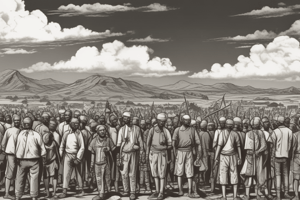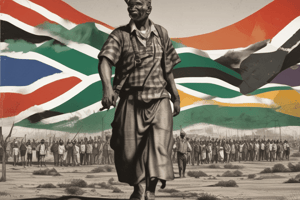Podcast
Questions and Answers
What is the system of government in South Africa?
What is the system of government in South Africa?
- Presidential democracy
- Authoritarian regime
- Constitutional monarchy
- Parliamentary democracy (correct)
Which branch of government is responsible for making laws?
Which branch of government is responsible for making laws?
- Judicial
- Legislative (correct)
- Cabinet
- Executive
Who elects the President of South Africa?
Who elects the President of South Africa?
- The Provincial Governments
- The Cabinet
- The people through a national election
- The National Assembly (correct)
What is the main function of the National Council of Provinces?
What is the main function of the National Council of Provinces?
How many members are in the National Assembly?
How many members are in the National Assembly?
What is the highest court in South Africa?
What is the highest court in South Africa?
What is the purpose of the Bill of Rights?
What is the purpose of the Bill of Rights?
What is the main function of municipalities in South Africa?
What is the main function of municipalities in South Africa?
Flashcards are hidden until you start studying
Study Notes
Structure of the South African Government
- The South African government is a constitutional democracy with a parliamentary system.
- The government is divided into three branches:
- Legislative: The Parliament, consisting of the National Assembly (NA) and the National Council of Provinces (NCOP).
- Executive: The President, who is both the head of state and head of government, and the Cabinet.
- Judicial: The Constitutional Court, the Supreme Court of Appeal, and other lower courts.
The President and Cabinet
- The President is elected by the National Assembly from among its members.
- The President appoints the Deputy President and the Ministers, who make up the Cabinet.
- The Cabinet is responsible for implementing policy and governing the country.
Parliament
- The National Assembly (NA) has 400 members, elected by proportional representation for a five-year term.
- The National Council of Provinces (NCOP) has 90 members, with 10 representatives from each province.
- Parliament's main functions are law-making, oversight, and representation.
Provincial and Local Government
- South Africa is divided into nine provinces, each with its own provincial government.
- Provincial governments have their own legislatures and executives, with some powers delegated from the national government.
- Local government consists of municipalities, which are responsible for providing basic services and infrastructure.
Key Constitutional Principles
- The Constitution enshrines the principles of democracy, equality, and human rights.
- The Bill of Rights guarantees fundamental rights, such as freedom of speech, assembly, and association.
- The Constitution also establishes the Constitutional Court as the highest court in the land.
Structure of the South African Government
- The South African government is a constitutional democracy with a parliamentary system.
- The government is divided into three branches: Legislative, Executive, and Judicial.
The Three Branches of Government
- Legislative: The Parliament, consisting of the National Assembly (NA) and the National Council of Provinces (NCOP).
- Executive: The President, who is both the head of state and head of government, and the Cabinet.
- Judicial: The Constitutional Court, the Supreme Court of Appeal, and other lower courts.
The President and Cabinet
- The President is elected by the National Assembly from among its members.
- The President appoints the Deputy President and the Ministers, who make up the Cabinet.
- The Cabinet is responsible for implementing policy and governing the country.
Parliament
- The National Assembly (NA) has 400 members, elected by proportional representation for a five-year term.
- The National Council of Provinces (NCOP) has 90 members, with 10 representatives from each province.
- Parliament's main functions are law-making, oversight, and representation.
Provincial and Local Government
- South Africa is divided into nine provinces, each with its own provincial government.
- Provincial governments have their own legislatures and executives, with some powers delegated from the national government.
- Local government consists of municipalities, which are responsible for providing basic services and infrastructure.
Key Constitutional Principles
- The Constitution enshrines the principles of democracy, equality, and human rights.
- The Bill of Rights guarantees fundamental rights, such as freedom of speech, assembly, and association.
- The Constitution establishes the Constitutional Court as the highest court in the land.
Studying That Suits You
Use AI to generate personalized quizzes and flashcards to suit your learning preferences.



